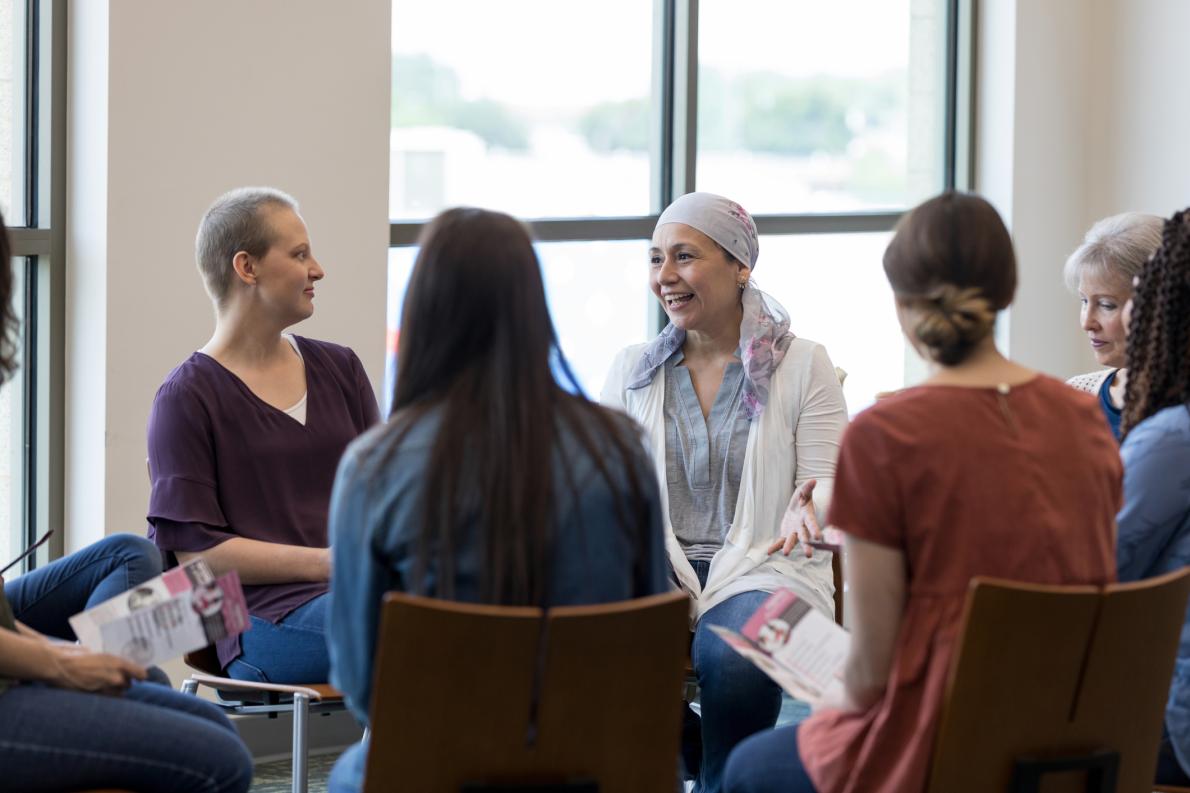The Importance of Support Groups for Brain Tumor Patients

Recovering from a brain tumor is a journey that encompasses physical and emotional challenges. Support groups offer a lifeline that provides a sense of community and valuable resources.
At The Preston Robert Tisch Brain Tumor Center (PRTBTC), we believe in the power of connection to foster healing and hope. This blog explores the importance of brain tumor recovery support groups for patients and caregivers—read on to learn more!
Why Brain Tumor Support Groups Matter
Facing a brain tumor diagnosis can feel like navigating uncharted territory. A brain tumor support group creates a space where patients and caregivers can connect with others who truly understand their experiences. The shared journey fosters a sense of belonging and normalizes the wide range of emotions that come with treatment and recovery.
→ Benefits of Support Groups:
- Emotional Support
Share stories and challenges to reduce feelings of isolation and anxiety. Many participants find solace in knowing they are not alone. - Practical Advice
Members often share tips for managing symptoms, navigating treatments, or addressing everyday challenges, offering insights that only those with firsthand experience can provide. - A Safe Space
Support groups provide a judgment-free environment where individuals can express fears, frustrations, or triumphs without hesitation. - Empowerment Through Knowledge
Many groups invite experts, such as oncologists or therapists, to provide educational sessions, helping members better understand their condition and treatment options. - Hope and Inspiration
Hearing stories of resilience and recovery can motivate patients to keep pushing forward, even during the most challenging times.
💡 Are you looking to support a partner or loved one? Check out our related blog: How to Support a Loved One with a Brain Tumor

Types of Recovery Support Groups
Support groups vary widely in structure and focus, ensuring there’s something to meet everyone’s needs. Here are the most common types:
- In-Person Support Groups: These traditional groups meet regularly at hospitals, community centers, or other accessible locations. In-person meetings foster deeper connections through face-to-face interactions.
- Online Support Groups: Virtual groups are ideal for those who cannot travel or prefer the convenience of meeting from home. Platforms like forums, video calls, and social media groups connect members across the globe.
- Caregiver-Focused Groups: Recognizing the unique challenges faced by caregivers, these groups provide dedicated support and resources to those caring for brain tumor patients.
- Condition-Specific Groups: Some support groups focus exclusively on specific brain tumor types or treatment stages, ensuring tailored discussions and resources.
- Activity-Based Groups: These groups incorporate activities like therapy, yoga, or meditation, combining emotional support with holistic healing practices.
How to Find Support Groups
There are numerous resources available to help you locate support groups:
- The Preston Robert Tisch Brain Tumor Center
Our center offers a variety of support options for patients and caregivers, from group meetings to individual counseling. - Hospitals and Community Centers
Many healthcare providers host support groups as part of their patient care services. - Online Platforms
Websites such as CancerCare, Brain Tumor Foundation, and Inspire offer online forums and virtual group sessions.
Success Stories: The Power of Connection
At PRTBTC, we’ve seen firsthand how support groups transform lives. Patients share their stories with us and often tell us about the friendships, coping strategies, and renewed hope they’ve gained through these connections. Here’s a notable story we love sharing:
“Reflecting on her journey, Rebecca expressed gratitude: ‘This is a very challenging diagnosis, and I’m one of the lucky ones. It’s the excellent care at Duke—from when both Friedmans took the time to personally call me, to the continuous support and treatment—that means so much to me. I just can’t speak highly enough about the opportunities Duke provides for its patients and the level of care they offer.’
Read her full story here: Rebecca Richmond: Finding Strength and Hope at Duke.
Take the Next Step Toward Healing
Support groups play a vital role in the recovery journey for brain tumor patients and their caregivers. They offer a sense of community, practical advice, and emotional resilience that can make the challenges of diagnosis and treatment more manageable. At The Preston Robert Tisch Brain Tumor Center, we’re here to help you find the resources and support you need to thrive.
Schedule an appointment today to learn how we can support your mental health and overall well-being. Our compassionate team of doctors is ready to walk with you every step of the way.
Explore our blog to learn more:
- How Does Brain Cancer Affect Everyday Life?
- What to Avoid After Brain Surgery
- How To Talk To Your Child About Their Brain Tumor
FAQ: Support Groups For Brain Tumor Recovery
1. Are support groups only for patients?
No, many support groups are designed for caregivers and family members as well. Some groups focus on the entire family unit to provide comprehensive support.
2. How much do support groups cost?
Many groups are free or low-cost, especially those offered by hospitals or nonprofit organizations.
3. What if I’m not comfortable sharing in a group setting?
It’s okay to start by listening. Many participants find that their comfort level increases over time, but there’s no pressure to share until you’re ready.
4. Can I join more than one group?
Absolutely. Some people find value in attending multiple groups to address different aspects of their experience.
5. How do virtual support groups work?
Virtual groups typically meet via video conferencing platforms like Zoom. Many also offer forums for ongoing discussion between sessions.